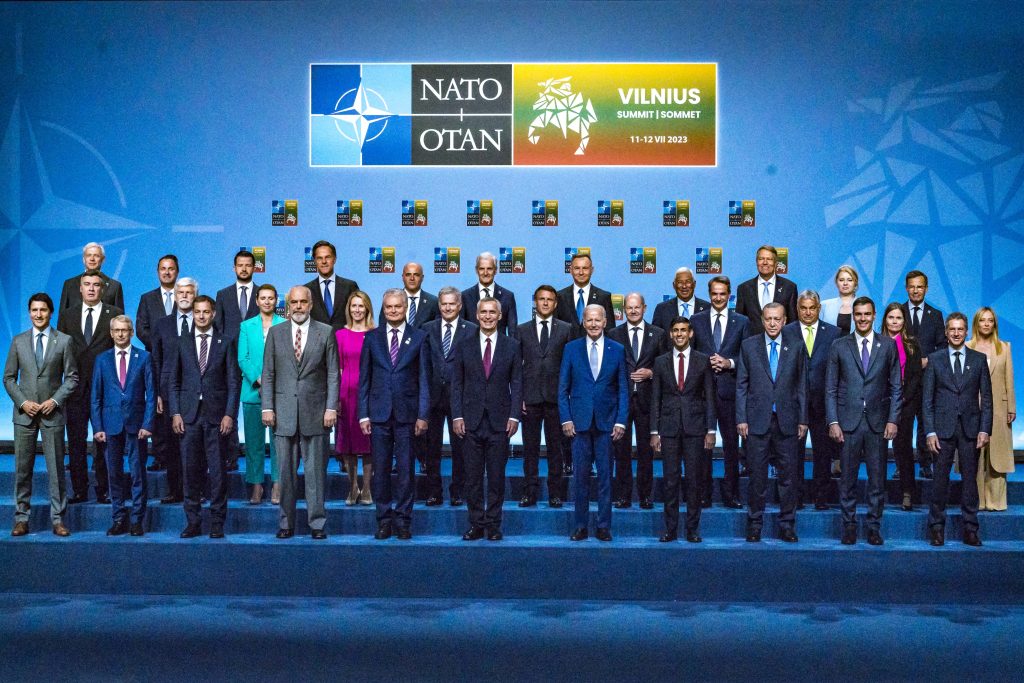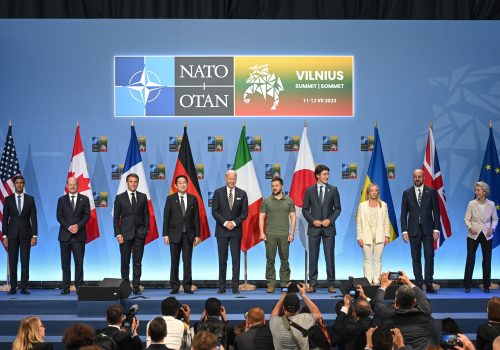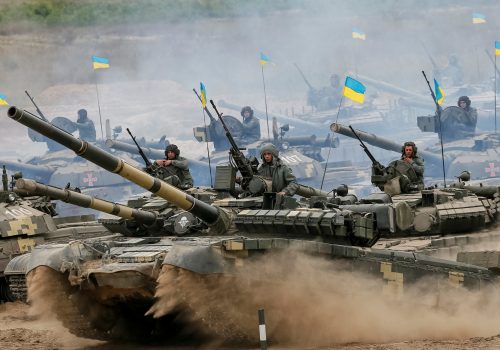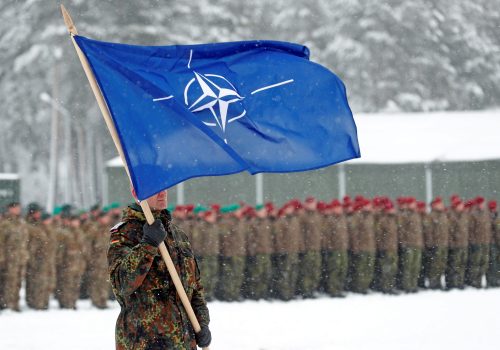NATO is getting bigger yet again. It started as twelve. Today it is thirty-one and growing. Finland joined in April. Sweden is in line. So is Ukraine. Others want to join, too.
But a bigger NATO also poses new challenges for an Alliance in which decisions are assumed to require consensus. The disputes at this year’s NATO summit in Vilnius drive this point home: France blocked the Alliance from opening an office in Japan, and there were a few stubborn holdouts on issues such as announcing security guarantees to Ukraine and on a pathway for Ukrainian NATO membership—even where the rest of the allies were aligned.
For a moment, the global media were priming to call the summit a failure, and NATO with it. Politicians and pundits could have once again started to claim, as French President Emmanuel Macron had done in 2019, that NATO was “brain dead.”
Luckily, with Japan having been invited to the summit, the Group of Seven (G7) was able to convene on the spot, and the decision on security guarantees could be taken there.
NATO cannot count on such luck most of the time, and it must not be left dependent on it. Instead, the Alliance should look for ways in which the widening of NATO membership can also be coupled with a deepening of its decision-making capabilities.
Widening requires deepening
NATO needs to adapt its decision-making methods so it can function more efficiently. It is the only way the Alliance can absorb still more members without adding more risk to its own functioning. And it may be the only realistic way NATO will be able to proceed with membership for Ukraine and other countries beyond.
“Widening requires deepening”: this has been the watchword of the European Union (EU) for sixty years, and the bloc has used it to good effect. NATO should now put this watchword to its own, unique use. Thus, as the Alliance grows in numbers (“widening”), it must also streamline its methods for taking decisions, so it can continue to act at least as effectively as before (“deepening”).
Adding new members adds to the capabilities of the Alliance, but it also adds a new drag risk to its decision making. In some ways, the structural drag is inherent. The initial rush of enthusiasm in joining the Alliance fades. Opportunities arise for making domestic political gain by obstructing a decision supported by the other allies.
And it is the nature of countries to make trouble. NATO has had decision-making trouble of all sorts—not just decisions blocked, but decisions delayed for a damagingly long time, decisions paid for by blackmail concessions, and decisions never even considered because it was supposed that someone would block them. The trouble has come from a number of countries. Some countries have made only occasional trouble. Others have become well known as troublemakers; it led in the 1990s to this unofficial NATO slogan about its impending expansion: “no more Frances, Spains, Greeces, or Turkeys.” And then there are the blockages that are simply never heard of—needful steps are dropped before ever making it to the stage of visible argument, because it’s assumed they’ll be blocked.
Thus, the need for deepening when widening.
NATO can take a page out of the EU book on this. When there is a political impetus for widening, the EU has used this tactically, as a motor force for getting its members to agree on deepening its decision-making. This deepening was needed in any case, but the members couldn’t find the political will to do it—until a widening was conditioned on it. All of the EU’s deepening accords—Single European Act, Maastricht Treaty, Amsterdam Treaty, Nice Treaty, and Lisbon Treaty—got done by making a widening depend on it.
Decisions, decisions
NATO has already made many decisions without a clean consensus. NATO has employed a “silence procedure,” in which it floats decisions that lack unanimous support and declares them adopted if no one officially “breaks silence” against them. In the 1980s it sometimes even decided by “consensus-minus-one,” letting a couple holdouts “reserve their positions” in footnotes to decisions. And when France wasn’t in the Military Committee, NATO would often take military decisions there to bypass France’s veto in the North Atlantic Council (NAC).
These innovations have kept NATO going. It has been valuable progress, but it is not sufficient. The risks and problems in making decisions continue to take a toll: decisions not taken, decisions not broached; irrationalities from consensus thinking, irrationalities from fears for consensus. This has gone on so long that it is taken for granted as the nature of things, not something whose costs are to be noticed, tallied, and corrected. The costs keep adding up, unseen.
How could this be improved on? Faced with the post-Soviet expansion prospects, former US Permanent Representative to NATO David Abshire and former Secretary of State James Baker independently suggested two ways:
- Revive consensus minus one or two.
- Take a weighted vote, with a supermajority bar to pass.
Such methods need not contradict the consensus culture. They could serve as a back-up option after the silence procedure, and in this way could actually be used to upgrade the consensus. Holding them in reserve ordinarily would preserve the culture. Pulling them out when silence is broken too unreasonably would do more: It would give a blocking country a strong incentive to make a deal before it loses its bargaining power, strengthening the culture. Straw votes could serve as a warning signal. The consensus culture would gradually accrue this element of democratic maturity.
Naturally, a number of questions arise about such a prospect.
Can this change be made?
Yes, if a determined diplomatic effort is made. Acceptance of vote results would be both easier and harder in NATO than in the EU: harder because it’s about defense, but easier for the very reason that NATO is not supranational like the EU. NATO is not about compelling members to act, or passing laws that the members must obligatorily implement in their domestic courts and legislation. Instead, it is about deciding on Alliance positions on international problems; letting the willing members implement these positions for NATO, sometimes using NATO assets (personnel and kit); and about joint preparatory work and training. This is easier to accept.
Should Article 5 be an exception?
No; it doesn’t need to be. In an Article 5 crisis, it’s up to each member to decide how to help, but the NATO decision itself is needed urgently. Failure to take a prompt decision could be the worst disaster.
Would it be lawful?
Yes. There is nothing in the NATO treaty to prevent a use of these procedures; the only decisions that require unanimity are treaty amendments such as accessions.
If the change in rules had to be made without consensus, could a minor discontinuity on rules be argued about in this? Yes, but such discontinuities often appear in decisions in international affairs, where contradictory imperatives and norms are the rule.
The NATO treaty was written—as its primary author, Theodore Achilles, took pains to explain to me in the early 1980s—to ensure there would be space for adaptation by leaving it to the NAC to set its own rules. It is what has enabled the NAC to create methods such as the silence procedure.
This, Achilles emphasized, was deliberate, so NATO could always find a way to decide as needed and so it wouldn’t be hamstrung by vetoes like the United Nations (UN) was. The Vandenberg Resolution’s argument in 1948 for creating NATO in the first place was that the veto in the UN Security Council prevented it from providing security. The spirit of the times in the late 1940s was to want to get past the hobbling of international bodies by their unit-veto rules.
Won’t it take a hard diplomatic effort to get this done?
Absolutely. And it’ll be well worth it. It will not only strengthen NATO in managing its existing problems and members. It will also expedite the next enlargements to Ukraine and beyond.
Ira Straus is a senior advisor at the Atlantic Council’s Scowcroft Center for Strategy and Security and a councilor of the Atlantic Council.
Further reading
Tue, Jul 11, 2023
Experts react: What NATO’s Vilnius summit means for Ukraine and the Alliance’s future
New Atlanticist By
Atlantic Council experts decode the summit's implications for Ukraine's membership, NATO's approach to China, and more.
Tue, Oct 3, 2023
Mass still matters: What the US military should learn from Ukraine
New Atlanticist By Andrew A. Michta
The overarching lesson from the unfolding war in Ukraine is simply the scale of what’s required to fight a modern state-on-state war.
Fri, Sep 15, 2023
The pathway to NATO’s ‘2/20’ goal is through real growth of defense spending
New Atlanticist By Wayne Schroeder
Next year’s NATO Summit in Washington is a golden opportunity for the Alliance to endorse a defense real growth pathway to its “2/20” guideline.
Image: Heads of State and Government pose for the family photo of the NATO Summit in Vilnius, Lithuania. (Photo by Celestino Arce/NurPhoto)



